Kamut flour comes from Kamut Khorasan wheat, an ancient grain. If you have any idea about the Middle East, you might know that ancient wheat is popular over there. Kamut flour, just by the name itself you can tell that it is the product of Kamut Khorasan wheat.
Here, we are going to let you know everything you need to and want to know about Kamut flour. What it is, the benefits, usages, the calorie count and nutrition facts, etc.
We will also discuss organic Kamut flour, white Kamut flour, the substitutes for Kamut flour, and the differences between Kamut flour and all-purpose flour. And don’t worry!
We’ll elaborate on the answers to some questions you all have been looking for whether it is gluten-free or not, and whether it is good for health, especially for heart health or not.
Let’s not delay any further, and just move forward!
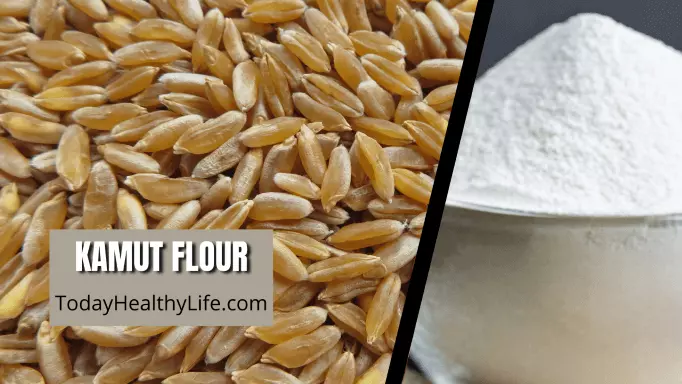
Table of Contents
What is Kamut flour
Kamut flour is the ground kernel of Kamut Khorasan wheat. You will find these ancient grains in Asia, mostly around the Middle East. You can find it in a place far from Asia too- in Egypt. The word Kamut itself is an Egyptian one.
As Kamut flour is an ancient type of flour that you can not modify, they have the exact same taste and nutrition; one of the richest to exist till now.
Kamut, the Egyptian word means wheat. This is a very special kind of wheat that people can not hybridize or modify genetically. To be more specific, Kamut is one of the purest kinds of wheat to exist.
That makes it all even clearer. Kamut flour is one of the purest kinds of grain flour.
Also Read:
- All about Glutinous rice flour | Vs rice flour, substitute, gluten-free?
- Brown rice flour: Nutrition, benefits, substitute, how to make, etc.
- What is finger millet flour? nutrition, benefits & side effects.
- What is wheat starch: benefits, substitute, is it gluten free & more.
Calorie count of Kamut flour
Kamut flour is ancient and pure. This is why it is high in calories.
Every 100 grams of Kamut flour contains 314 calories!
The amount seems surprisingly high, but that is good news for us. A great source of carbohydrates with high calories- it surely can boost your energy.
Kamut flour nutrition facts
As pure as Kamut flour is, its nutrition facts have some real variety as well.
Let’s take a look at the nutrition facts of Kamut flour.
NB: The amounts and daily values are based on every 100 grams of Kamut flour.
| Nutrient name | Amount | Daily value | Works |
| Carbohydrate | 60.9 grams | 23% | Carbohydrates are the fuels of the organic body. It burns calories to give you the energy you need. Apart from this, people need carbs during their phase of growth for body development. |
| Protein | 15 grams | 30% | Protein is yet another nutrient that helps your growth, muscle development, and energy build-up. This is one of the biggest reasons why athletes are always consuming protein shakes. |
| Vitamin B | Vitamin B1= 0.12 gVitamin B3= 3.15 mg | Vitamin B1= 13.5%Vitamin B3= 33% | Just carbs intake is not sufficient if you lack vitamin B1. This vitamin is responsible for the metabolism system as well. It is also great for muscle and nerve health. And, vitamin B3 is the nutrient that reduces the risks of arthritis, reduces cholesterol, and helps the body function system. |
| Calcium | 22.04 mg | 22% | Calcium is the most effective and important nutrient for bone health. It strengthens both your teeth and bones. |
| Magnesium | 65.04 mg | 19.6% | Magnesium supports human muscles and the nerve system, and it helps with the energy production inside the human body. |
| Zinc | 1.84 mg | 28% | Zinc is one of the most important minerals for the immune system of the human body. It helps with metabolism too. |
| Fats | 2.3 grams | 3% | Not all fats are bad. There are good fats too, and they are like the backup storage of energy. Also, a small number of fats help the proper growth of fetuses. |
Organic Kamut flour
Khorasan wheat grains are double the size of normal wheat grains.
To make organic Kamut flour, you’ll need to grind Khorasan wheat grains manually, with stone. The stone-ground Kamut flour is the organic one, and the flavor is exceptionally rich, and nutty.
Organic Kamut flour itself is traditional. In Egypt and the countries of the Middle East, they collect Khorasan wheat for the sole purpose of making Kamut flour out of it. They do the whole grinding manually with stone. It requires a great amount of labor though!
The best thing about organic Kamut flour is- that it has zero cholesterol and it has dietary fibers in it. These facts have made Kamut flour a really health-friendly ingredient.
They might sell packets of Kamut flour claiming that it’s organic. But, always remember the hack, if the flavor is not nutty and slightly muddy, that is not organic. Because stone-ground flour will always have a slightly muddy flavor.
White Kamut flour
Kamut flour has some variety too; it comes in white as well.
You’ll need to mill Kamut wheat berries and make sure that you don’t bleach them. Bleaching is not necessary to make Kamut flour white, as it will come out white naturally.
White Kamut flour is kind of organic too; even though it is not 100% stone ground. But while you are milling Khorasan wheat, if you sustain from adding anything else or bleaching, the flour will come out white just like this.
And this is what makes white Kamut flour even better if you don’t need to bleach, add extra flavor, or modify it any further. Simple milling is more than enough!
Kamut flour vs all purpose flour
The comparison is one of the most frequently asked questions out there.
Kamut flour is ancient, all-purpose flour is comparatively modern.
Even then, both are flour and do the exact same jobs- what could be so different between these?
Let’s take a look at the comparative discussion.
| Feature | Kamut flour | All-purpose flour |
| Origin | Kamut flour is made from Khorasan wheat, which is native to The Middle East and Egypt. This is an ancient grain that you can not modify. | All-purpose flour is the ground kernel of regular red wheat. This grain is contemporary, and they have modified it for a long time and have been modifying it till now. |
| Making process | Kamut flour is all stone ground without the involvement of automation. Though, while making white Kamut flour, you’ll need to mill it. | All-purpose flour might be stone-ground or automation ground. |
| Nutrients | As an unchanged ancient grain, Kamut flour is richer in nutrients. | All-purpose flour is slightly less rich in nutrients than Kamut flour. |
| Availability | Kamut flour is not widely available if you consider the global context. Though it is available in the Arabian regions. | All-purpose flour is worldwide available. |
| Works | Kamut flour is good for baking and thickening. It is better for thickening than all-purpose flour because of the nutty flavor. | All-purpose flour is great for baking too- but it works slightly less for thickening than Kamut flour. |
But hey! You will still go for your preference, and both are good in their ways!
Kamut flour substitutes
This old-school flour is rich in both flavors and nutrients. But, as we’ve mentioned above, Kamut flour is not worldwide available, you’d have a hard time finding it in local shops outside the Arabian regions.
In that case, it’s just better to know about the substitutes for Kamut flour.
Here we go!
All-purpose flour
All-purpose flour is a good pick for the substitute.
This flour is from wheat, so even the taste will match. And it is good for baking just like Kamut flour!
The expertise in all-purpose flour includes-
- It is super good for baking. You can bake cookies, cakes, muffins, bread- pretty much anything with it!
- All-purpose flour is pretty cheap, you can buy it with a small amount of money.
- And most importantly, it is super available- they have all-purpose flour at almost any shop!
Wheat flour
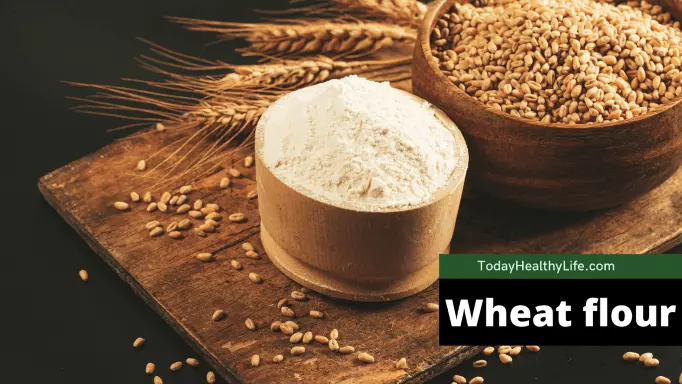
Wheat flour is another good substitute. It is also similar to Kamut flour both in origin and work. Even though normal wheat is different from Khorasan wheat. This is still good.
And about the expertise wheat flour can offer-
- Wheat flour is good for baking purposes too!
- Like all-purpose flour, wheat flour is cheap and available too!
- Though cheap, wheat flour is good for health.
Rice flour
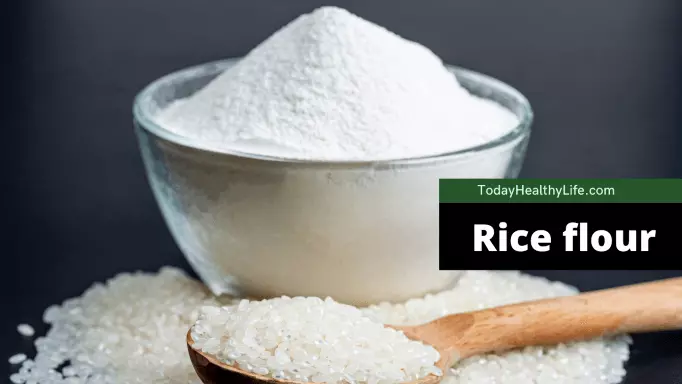
It is a good option too! Considering that Kamut flour is better for baking rather than thickening, rice flour can be a good substitute.
Rice flour is surprisingly different in flavor, but it is really popular around Asia. Besides-
- Rice flour is good for baking pretty much everything!
- Apart from baking, rice flour is a good thickener too!
- It is mostly organic, hence a good choice to maintain a healthy lifestyle.
Corn flour
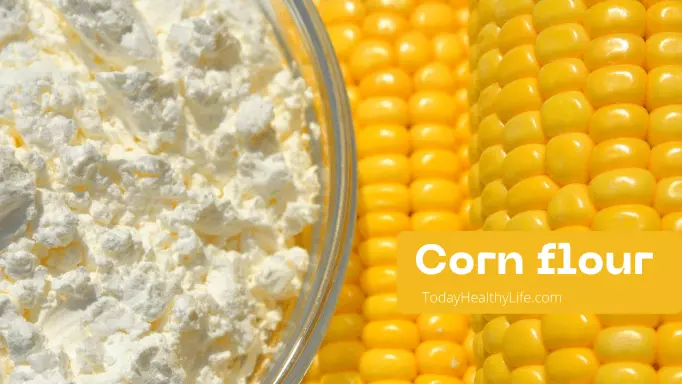
It might be a good pick too! You can even find them gluten-free if you search. And this flour is good for both baking and thickening! The expertise includes-
- You can bake things with cornflour.
- But it is better for thickening- be it soup, sauce, or curry.
- Corn flour is interestingly a good crusting agent too!
Wheat starch
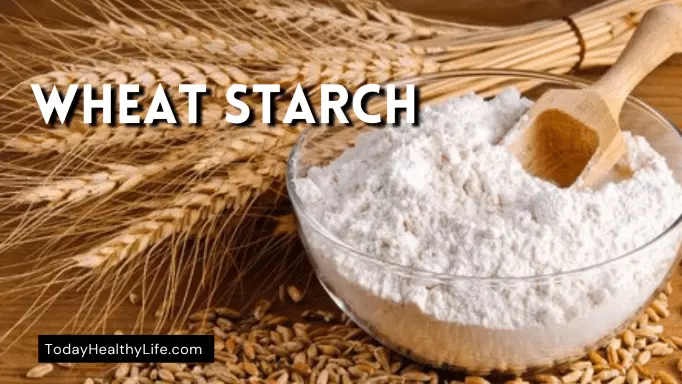
It is another good option as a substitute. Though it is not the best option for baking, at least it has similar flavors and is good for thickening. The expertise includes-
- Thickening soup, sauce, and curry.
- Adding flavors to Chinese foods.
But, wheat starch is not that good of a substitute for Kamut flour because it is not good for baking. While Kamut flour’s best job is baking.
Still, we have provided the list regardless. For the urgent kitchen businesses, you can use any of those available around you as you will be the judge.
Is Kamut flour gluten free?
Kamut flour is ancient. You can not modify them.
To put it simply, you can not remove the proteins from Khorasan wheat grains.
And that means Kamut flour is not gluten-free. If you have any sort of celiac disease, better avoid anything made with Kamut flour.
Is Kamut flour good for you?
The answer to this question is usually yes, but depending on certain circumstances, it might turn into a no too.
The answer would be a big yes if you are someone with normal health. Kamut flour is highly nutritious and has good fibers. So it is usually good for you and your health.
But, if you have celiac disease, or if you are allergic to wheat, the answer will be no.
Kamut flour benefits
Kamut flour is not your ordinary kitchen flour. It is from one of the most treasured grains in history.
So it is only natural that Kamut flour has so many benefits.
Let’s take a look.
- As it is high in calories, Kamut flour is great for recovering and producing energy.
- Kamut flour has a good amount of fibers. So, it is quite heart-friendly. They can be great for keeping cholesterol in control.
- As an ancient grain, Kamut flour is highly rich in many minerals and vitamins. It is one of the most balanced carbs to exist. Kamut flour is a healthy carb.
- Kamut flour is good for your nervous system and muscle health. I mean, don’t you think that the Arabs are really strong?
So, what do you think in this regard? Pretty impressive, right?
Probable side effects of Kamut flour
Though Kamut flour is great from many perspectives, it still has three potential risks.
- Kamut flour is not gluten-free. So, it can cause immune reactions in people with celiac diseases if they consume it.
- People who are allergic to wheat can get severe reactions in their bodies if they consume Kamut flour.
- Kamut flour is still a carb-type food. Overconsumption of Kamut flour might lead to weight gain.
Other than these probable risks, Kamut flour is all good to go!
Let us know what you think about it, let us know if you have any questions as well. You can just drop a comment in our comment box below.
And most importantly, remember to contact a doctor firsthand if you ever feel any medical urgency.
Eat healthily and live well!
